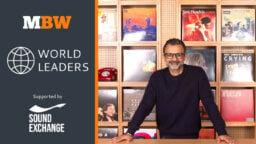MBW’s World Leaders is a new regular series in which we turn the spotlight towards some of the most influential industry figures outside the US and UK markets. In this feature, we speak to David Alexander, the founder of South Africa-based Sheer Publishing, which was acquired by Downtown Music Holdings earlier this year.

Africa’s music business is flourishing. On the one hand, we’re witnessing superstar artists and music entrepreneurs like Nigeria-born Mr Eazi and South Africa’s DJ Black Coffee drawing deserved attention to the wider continent’s rich creative industries and influence on global pop music.
On the other, we’re seeing an increasing slate of investment from western music companies in local startups, artists and music scenes across the continent, highlighted by the opening of offices in local markets from the likes of Platoon in South Africa and Universal‘s Def Jam Africa, to name a couple.
Not to mention the launch and uptake of music streaming services like Spotify and the rise of licensed local services such as Boomplay, helped by Africa’s soaring smartphone usage and the fact that it’s home to one fifth of the world’s youth population.
Adding to the growing number of US companies with a physical presence in the macro African music market, New York-born Downtown Music Holdings recently expanded its geographic footprint to the continent in May via the acquisition of Johannesburg-based Sheer Music Publishing.
Sheer, founded in 1996 by Managing Director David Alexander (pictured), is Africa’s largest indie music publisher. The acquisition will see Sheer and Downtown develop new services specifically designed for the needs of African creators, with Sheer operating as a standalone business under Downtown.
“There seemed to be a growing interest in the continent by the larger players in the industry who were opening regional offices and leapfrogging us in our own backyard,” Alexander explains, commenting on Sheer’s decision to team up with Downtown.
“I have always been an advocate of African Music and the African Music market, but with the limited resources at our disposal, Sheer could only grow organically. I was looking for a like-minded partner who was as passionate as me about the continent.”
Here, Sheer MD David Alexander recounts his career in music publishing, and explains the challenges opportunities in the publishing sector in Africa.
WHAT WAS THE STATE OF THE PUBLISHING SECTOR LIKE IN SOUTH AFRICA in the early years of sheer, AND HOW HAS IT EVOLVED SINCE THEN?
I remember the time I used to attend the Annual General Meeting of SAMRO (PRO). In the first few years, only the Board and the General Manager were in attendance along with two members: one was a composer and the other was me… a publisher. So there was little or no participation by members in the process and no feedback from members to the strategic direction the Board was taking.
Today we get over 300 members turning up in person and more than that via proxy because the members realise the value of their participation and the importance of the PRO to their welfare.
In the early ’90s in South Africa there were two MROs who competed with each other and that allowed the music users to get favourable pricing by playing them off against one another. I was one of the founders of a new MRO which we called CAPASSO (Composers Authors and Publishers Association of South Africa) which has grown from R25m (around $1.7m) in 2014, the year of its founding, to nearly R150m (around $10m) in 2020.
TELL US ABOUT SOME OF THE BIGGEST CHALLENGES FOR THE PUBLISHING SECTOR IN SOUTH AFRICA (AND THE WIDER CONTINENT) today.
Throughout Africa the level of awareness of the importance of IP rights is an issue. Due to the long term inertia and systemic inability of local CMOs to establish fair licensing of music users and payout according to usage, there is no understanding of what the potential reward could be of holding onto rights and monetising them over time.
The entrenched model of payment to songwriters by membership of the CMO perpetuates a lack of awareness of publishing rights: even if the songwriter is a member of the CMO, there is no value in notification of their works as there is never a payment according to usage of those works.
“Educating African creators about the value of their IP and how to monetize it over time is something we are all passionate about.”
Producers are generally commissioned by frontline artists/labels and retain no rights in their songs after delivery. That often allows the artist to credit themselves as the songwriter, removing the producer’s name completely from the IP chain, as the exchange in value was from the initial sale of the song. Therefore, there is no long-term expectation of royalty payments.
The team at Sheer Music Publishing offers world class experience, with local solutions to teach and transfer skills to the music industry. The team members are leaders and game changers in the industry, playing a pivotal role in the establishment of industry bodies such as SAMEX, MOSHITO and CAPASSO. Educating African creators about the value of their IP and how to monetize it over time is something we are all passionate about.
There has definitely been a shift in the level of awareness of IP issues: through our advocacy and member engagement there has been a behavioural shift in many of the African CMOs wanting to improve their service to their members and run distributions according to usage.
TELL US ABOUT SOME OF THE BIGGEST OPPORTUNITIES ON THE WIDER CONTINENT CURRENTLY.
The move to digital has brought inequality in the value of international over domestic repertoire due to many factors – some our own speed as an industry in moving music online and other structural barriers such as availability of electricity, access to broadband and cost of data.
Sheer Publishing joins the global call for the reform of the payment models used by certain streaming platforms in favour of a model which calculates royalties on a fixed ‘per play’ rate/pay per stream.
“THE MOVE TO DIGITAL HAS BROUGHT INEQUALITY IN THE VALUE OF INTERNATIONAL OVER DOMESTIC REPERTOIRE DUE TO MANY FACTORS.”
The model currently in use by some platforms involves complex algorithms that calculate royalties based on the geographic location where the streaming occurs, and royalties are then aggregated based on all streaming activity.
I believe that such models inherently disadvantage African artists, publishers and the repertoire of niche genres, and particularly works which might not be streamed very often.
As the value gap and payment reform are dealt with, the African creators stand to benefit hugely from their own content.
HOW HAVE DEALS WITH SONGWRITERS EVOLVED?
I may be showing my age but when I started in the industry the standard publishing deal was Life Of Copyright (LOC) and a 50/50 split on royalties. So to get traction as a new publisher without an established brand we offered a one third vs two thirds deal which made us very attractive to writers who believed that they deserved the lion share from their own Copyrights.
Over time there has been a general phasing out of LOC deals and move to fixed-term retention which again favours the songwriter’s long-term interests.
Today, of course, most writers are requesting administration deals instead of the assignment of rights. This is testament to how the creators have become more informed and empowered about their rights and the roles and responsibilities of the publisher.
SHEER AND DOWNTOWN PLAN TO DEVELOP NEW SERVICES SPECIFICALLY DESIGNED FOR THE NEEDS OF AFRICAN CREATORS, COULD YOU TELL US ABOUT THESE SERVICES AND THE TIMESCALE YOU ARE AIMING FOR, IN TERMS OF THE DEVELOPMENT AND ROLL OUT OF THESE SERVICES?
I believe the real opportunity is in localisation of the existing creator-centric services which fall under the Downtown Music Holding umbrella. The initial roll out plan begins with the artist-facing CD Baby service which is relatively unknown on the African continent. Plans to roll that out revolve around pricing in the short term and then in the longer term localization with look and feel as well as language.
Songtrust is another key tool in dealing with the size and breadth of the African continent and while we are rolling out in Anglophone Africa in the short term we will also look to localize this service with language as well as look and feel.
THERE HAS BEEN A LOT OF INVESTMENT IN THE AFRICAN MUSIC BUSINESS OVER THE LAST FEW YEARS – WHAT ARE YOUR VIEWS ON THE INCREASED GLOBAL INTEREST IN THE CONTINENT’S MUSIC INDUSTRY?
It is very exciting to see the sudden flurry of announcements of deals with African players, and the majority seem to be founded in the shared belief of the value of the African creators. Some historical deals have followed the extractive value model where revenue is extracted from the continent and taken offshore; there has been local pushback to these types of deals as they can look or feel like cultural colonialism.
“IT IS VERY EXCITING TO SEE THE SUDDEN FLURRY OF ANNOUNCEMENTS OF DEALS WITH AFRICAN PLAYERS AND THE MAJORITY SEEM TO BE FOUNDED IN THE SHARED BELIEF OF THE VALUE OF THE AFRICAN CREATORS.”
The alignment between Sheer and Downtown around creator centric partnerships means that we can use the additional resources that Downtown has to add fuel to what we are already doing in the market.
The market is also large – large enough for players of all sizes and from all over to achieve what they are looking to do. I can only hope that they treat the local players as knowledgeable experts and don’t try and impose developed market practices in our local market.
YOU ALSO MENTIONED THAT AFRICA IS A HIGH POTENTIAL MARKET FOR DIGITAL MUSIC SERVICES. COULD YOU EXPAND ON THIS?
Africa is home to 1.3 billion people, roughly 17% of the world’s population. The median age is 20 years old so it is a very youthful population. The youth are ready to jump the digital divide – they just need to have access and the right price point.
“WE ALREADY SEE HUGE NUMBERS OF YOUTUBE STREAMS BUT THE VALUE BACK TO THE MUSIC INDUSTRY IS LOW AS A FACTOR OF THE ADVERTISING SPEND ONLINE.”
We already see huge numbers of YouTube streams but the value back to the music industry is low as a factor of the advertising spend online.
Traditional advertising uses terrestrial broadcast or out of home touch points but it is slowly waking up to the opportunity for targeted online spending.
The fact that Africa only accounts for less than 1% of global music revenues (according to CISAC) highlights the opportunity between the size of the market and the current rate of return.
WHAT ARE THE CURRENT BARRIERS TO GROWTH FOR STREAMING SERVICES IN SOUTH AFRICA AND THE WIDER CONTINENT CURRENTLY AND HOW CAN THE INDUSTRY OVERCOME THOSE BARRIERS?
In South Africa we already have many streaming services but the main pain points are the cost of data and the individual service price point.
Local telcos have been making huge margins on voice and then more recently on data – to the point where the regulator has had to step in. As the cost of data falls there will be a much larger uptake on affordable streaming services.
“AS THE COST OF DATA FALLS THERE WILL BE A MUCH LARGER UPTAKE ON AFFORDABLE STREAMING SERVICES.”
The challenge on the rest of the African continent is much the same but with the added barrier of sustainable electricity supply. Many major African capitals have intermittent electricity and that has a further negative impact on the pain points I already mentioned.
Tech entrepreneurs are rushing to supply “free” wifi via high orbit balloon or satellite. Data on the rest of the African continent is already much cheaper than in South Africa. New music services from China and India are testing price points far below the mainstream services in the developed countries and African music entrepreneurs are working on their own streaming services to compete regionally.
Music Business Worldwide





